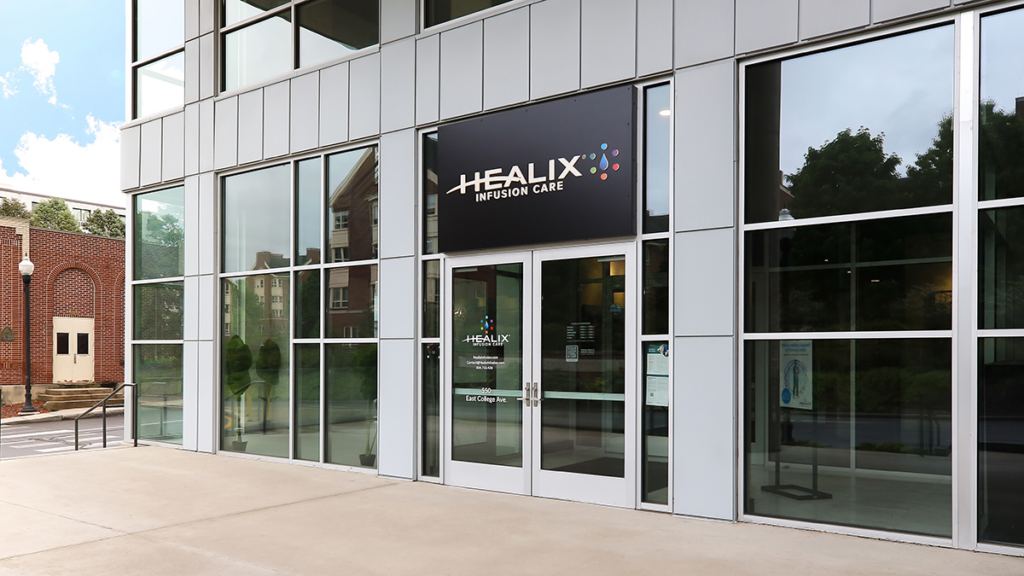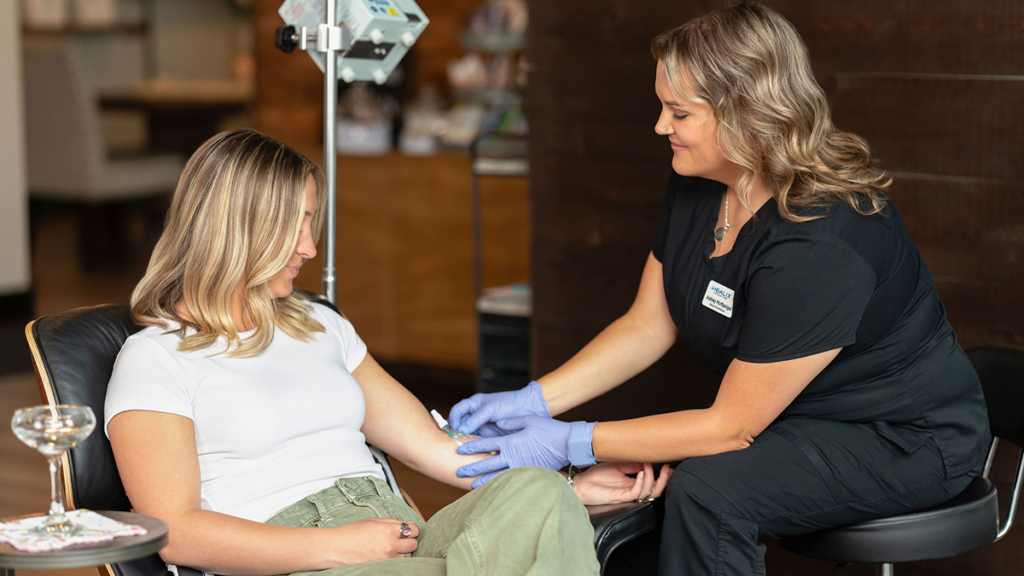
By Holly Riddle
During the Covid-19 pandemic, Liz Holtzinger, co-founder of AguaVivir, was looking for an entrepreneurial opportunity. A seasoned entrepreneur — with past experiences running a resume writing company, professional development company and media company — when she came across the concept of wellness infusion centers, it seemed like an ideal opportunity. At the time (and still, to some degree), these types of centers were more popular on the West Coast, with limited spread in the East, but there was ample potential to serve those hoping to tap into the myriad benefits of hydration and vitamin IV therapy. Thus, AguaVivir was created.
Three AguaVivir locations opened at once, one in downtown State College and two outside of Pittsburgh, all offering wellness infusions aimed to help clients with performance and recovery, immunity and other concerns.
“As we got further into the business, we came to the shocking realization that this was largely a new concept for the East Coast,” explained Holtzinger. “Growth was going to require…a massive effort educating the public on what this was and why they needed it.”

So, the team turned to a different product line that could boost the business, and AguaVivir began incorporating medical infusions into its offerings, specifically focusing on patients with autoimmune disorders such as multiple sclerosis, lupus, Chron’s disease, IBD, or rheumatoid arthritis, to name a few.
“We knew there were plenty of people who have autoimmune conditions in State College and Pittsburgh, who don’t have a lot of options to receive their infusions, beyond going to a hospital facility,” said Holtzinger. “The hospital facility is not a pleasant environment, and it can also be overbooked with chemotherapy patients. It’s understandable that a cancer patient would take priority over an autoimmune patient, but this can mean the autoimmune patient may not get the treatment when they want it or need it. When they don’t get treatment, that just exacerbates their symptoms.”
Holtzinger wanted to provide these patients with an alternative, with a warm, comforting environment, similar to a high-end spa, where they could receive the medical infusions they needed to improve their lives in an environment as comfortable as their homes.

“If you can imagine a high-end hotel lobby and a lounge and a spa, that’s what our facilities look like,” she said. “They are very warm and inviting, and very conducive for an autoimmune patient specifically, because, across the nation, according to the National Institutes of Health, 8% of people have an autoimmune condition, and of that 8%, 80% are women, so the environment is aesthetically pleasing specifically for those patients.”

To be clear, though, Holtzinger does not see the business as in competition with the traditional healthcare system. Instead, she views it as a partnership.
“We’re taking a load off the hospital system, so that everyone in the hospital system, as well as in our centers, is getting the right care at the right time in an optimal setting.” For example, if the hospital staff is overburdened, they may be stressed out and the patient may not be getting optimal care. “If we can take some of the workload off them, it’s better for everyone,” she said.
Switching to a new medical focus, though, required a lot of startup capital, as well as relationships with insurance providers and the healthcare providers that would need to write prescriptions for patients’ infusions. As such, AguaVivir began weighing its options, from private equity investors to possible buyers. There were several interested parties, but the “fit” with Healix, LLC, was the best.
Based in Texas, Healix, LLC has been in the infusion business for more than 35 years and specifically specializes in-office and ambulatory, standalone infusion centers like AguaVivir. After discussions, it made perfect sense for Healix, LLC to acquire AguaVivir, providing not only funding, but also massive clinical resources and expertise and business operations support, which allows Holtzinger to still fulfill her mission of helping the community.
“I have always, literally my entire life, invested in other people and helping them unlock their potential. In every venture, that has been at the core of what I have always intended to do.”
“I have always, literally my entire life, invested in other people and helping them unlock their potential. In every venture, that has been at the core of what I have always intended to do,” she said.
As of 2023, AguaVivir became Healix Infusion Care, but it still has its three original locations, including one on East College Avenue, and much of the original team has remained, including Holtzinger. Healix Infusion Care still offers the original wellness-focused infusions that AguaVivir started with, too, but Holtzinger says about 90% of the center’s clients visit for medical infusions.
“I want patients to be empowered to say to their doctor, ‘I don’t want to be on the waiting list at the hospital infusion center. I want to go somewhere I know I’m going to get the same expertise and care that I would in a hospital setting, but in a much nicer environment and in one that will actually cost me less.”
In summary, she noted, “I want people with an autoimmune condition, who are getting treatments like these, to know that they have a choice in where they receive their infusions… When the doctor writes that order and says they’re going to keep them on a treatment, the patient can say, ‘I’d like to go to Healix.’ We have payer contracts with all the major providers, including Medicare. I want patients to be empowered to say to their doctor, ‘I don’t want to be on the waiting list at the hospital infusion center. I want to go somewhere I know I’m going to get the same expertise and care that I would in a hospital setting, but in a much nicer environment and in one that will actually cost me less.’”
Holly Riddle is a freelance lifestyle and business journalist. She can be reached at holly.ridd@gmail.com.

